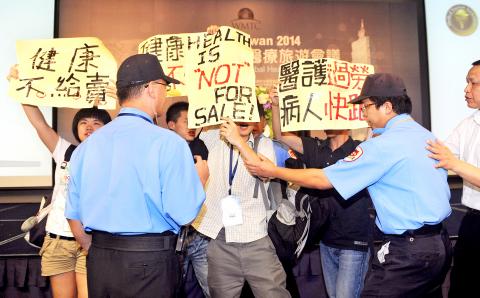Several healthcare reform groups yesterday panned the government’s medical tourism plan, saying it was just a ploy for favoring big corporations by allowing them to set up profit-making medical centers in the proposed free economic pilot zones.
Dozens of representatives from the Doctors’ Working Conditions Reform Task Force, the Taiwan Radical Nurses Union, the Taiwan Healthcare Reform Foundation, Covenants Watch, the Taiwan Association for Victims of Occupational Injuries and the Black Island National Youth Front staged a protest outside the Taipei International Convention Center, where the Asia segment of the annual World Medical Tourism and Global Healthcare Congress was being held.
More than 400 medical experts from a dozen countries are attending the two-day congress, the first time it is being held in Taiwan.

Photo: Liao Chen-huei, Taipei Times
The opening ceremony yesterday morning was temporarily interrupted when a small group of protesters rushed toward the speaker’s podium while chanting slogans and holding cardboard signs that read: “Health is not for sale.”
“The congress here may be branded as an ‘academic seminar,’ but it is in fact a platform for the Ministry [of Health and Welfare] to spread its propaganda on international medical centers and the free economic pilot zones,” said Ellery Huang (黃致翰), a physician and member of the Doctors’ Working Conditions Reform Task Force.
Huang said the ministry should refrain from “goofing around and pandering to deep-pocketed corporations,” particularly at a time when the country’s National Health Insurance program is heavily in debt and healthcare professionals face adverse conditions at work.
“We hereby demand that the ministry work to identify the root causes of the nation’s collapsing healthcare system and stop promoting something that seeks only to satisfy the needs of big corporations and overseas patients,” Huang said.
“We also urge the ministry to invest more resources to improve the employment environment of frontline medical personnel who have fallen victims to an ‘M-shaped’ healthcare system, instead of attempting to lure the country’s talent into the for-profit medical centers in the [planned] pilot zones,” Huang said.
Huang also called on the ministry to endeavor to safeguard the public’s right to healthcare and avoid its commodification, as well as to prevent financially disadvantaged patients from being marginalized because of some doctors’ slavish pursuit of wealth.
According to the government’s preliminary plan, the proposed international medical centers will primarily provide high-end physical examination services and cosmetic surgeries, which will not be covered by the National Health Insurance program and must be paid by patients out of their own pockets.
Taiwanese doctors will be allowed to take on part-time jobs at the centers and work a maximum of 20 hours per week.
Taiwan Healthcare Reform Foundation researcher Chao Meng-chieh (趙孟捷) identified three major problems in the government’s plan to set up the centers.
“First, the nation already faces a severe shortage of healthcare personnel and the establishment of the centers would only aggravate the problem,” Chao said.
Second, the ministry’s relaxation of hospital regulations for the centers will only make under-the-table irregularities even harder to detect, Chao said.
And third, the centers’ for-profit objective could undermine the healthcare system’s core value of being patient-centered, Chao said.
The protesters also demanded that President Ma Ying-jeou’s (馬英九) administration retract the draft of the special act for free economic pilot zones, which it intends to push through the legislature before the current extra session ends on Friday next week.

Nipah virus infection is to be officially listed as a category 5 notifiable infectious disease in Taiwan in March, while clinical treatment guidelines are being formulated, the Centers for Disease Control (CDC) said yesterday. With Nipah infections being reported in other countries and considering its relatively high fatality rate, the centers on Jan. 16 announced that it would be listed as a notifiable infectious disease to bolster the nation’s systematic early warning system and increase public awareness, the CDC said. Bangladesh reported four fatal cases last year in separate districts, with three linked to raw date palm sap consumption, CDC Epidemic Intelligence

The manufacture of the remaining 28 M1A2T Abrams tanks Taiwan purchased from the US has recently been completed, and they are expected to be delivered within the next one to two months, a source said yesterday. The Ministry of National Defense is arranging cargo ships to transport the tanks to Taiwan as soon as possible, said the source, who is familiar with the matter. The estimated arrival time ranges from late this month to early next month, the source said. The 28 Abrams tanks make up the third and final batch of a total of 108 tanks, valued at about NT$40.5 billion

Two Taiwanese prosecutors were questioned by Chinese security personnel at their hotel during a trip to China’s Henan Province this month, the Mainland Affairs Council (MAC) said yesterday. The officers had personal information on the prosecutors, including “when they were assigned to their posts, their work locations and job titles,” MAC Deputy Minister and spokesman Liang Wen-chieh (梁文傑) said. On top of asking about their agencies and positions, the officers also questioned the prosecutors about the Cross-Strait Joint Crime-Fighting and Judicial Mutual Assistance Agreement, a pact that serves as the framework for Taiwan-China cooperation on combating crime and providing judicial assistance, Liang

A group from the Taiwanese Designers in Australia association yesterday represented Taiwan at the Midsumma Pride March in Melbourne. The march, held in the St. Kilda suburb, is the city’s largest LGBTQIA+ parade and the flagship event of the annual Midsumma Festival. It attracted more than 45,000 spectators who supported the 400 groups and 10,000 marchers that participated this year, the association said. Taiwanese Designers said they organized a team to march for Taiwan this year, joining politicians, government agencies, professionals and community organizations in showing support for LGBTQIA+ people and diverse communities. As the first country in Asia to legalize same-sex